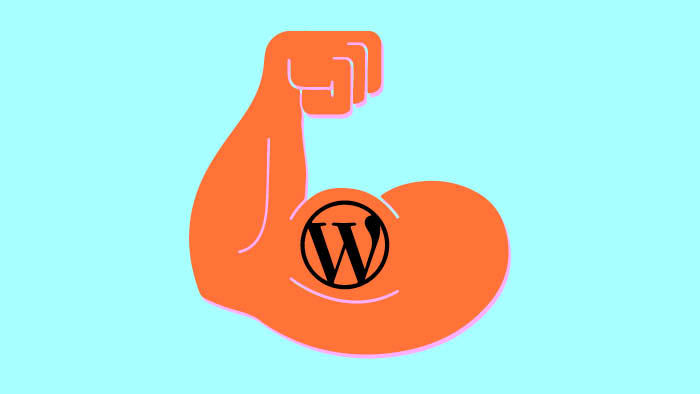Among the different tools, methods, and techniques available to create a website, the use of a content management system (CMS) programs represents one of the main, most popular methods of website creation.
But, you have to keep in mind that there are a plethora of different types of CMS programs, and among all of them, WordPress has managed to differentiate itself and stand out. This is largely due to all its unique advantages: WordPress is an easy to use and flexible enough system to make it an adequate tool for the creation of various types of websites from basic portfolio websites to complex, multilayered, professional business websites.
But if this CMS has many strengths like its simplicity, its organization, its ease of implementation etc., it is not without flaws either. So it is important for you to have an overview of the strengths and weaknesses of using WordPress to have the whole picture and be ready to make an informed decision on whether you should use WordPress in your projects or not.
Strengths of WordPress
#1 Easy to Use, Quick to Learn
I find that WordPress is built around consistency and accessibility — this has been the design philosophy of WordPress’s developers from day one. This makes the CMSeasy to use, well organised and intuitive enough to be quickly picked up.
This means that you can start on your project in a relatively short time instead of spending weeks and months learning the development platform. This cuts down on development time, cost, and the minimum amount of experience you need to get started, which makes WordPress a favourite for people who want to start quickly and don’t have a lot of technical expertise.
#2 Customisable
News feeds, library management, activity calendar, user registration, photo collages, etc. — there are hundreds of widgets and elements you can readily use in your website, and each of these elements is highly customisable. You can tailor them to your needs completely.
This is why you see WordPress being used in everything from Fortune 500 websites that teams of more than tens of people constantly work on and monitor to hobbyist websites that are completely developed and managed by a single person.
#3 A Huge Amount of Resources Available
WordPress has a huge community of developers and users, and this results in two main advantages that most developers absolutely can’t do without:
- so there are many plugins of all kinds that are developed by the WordPress community: these plugins not only extend the features of your website and make it more secure, more accessible, etc. The options are limitless.
- Tutorials, tips, and articles: whether it’s in video or through didactic articles, it’s a safe bet to assume that you’ll find answers to almost all your questions from the simplistic to the highly technical.
Weaknesses of WordPress
#1 Updates
If there is one weakness that absolutely needs to be highlighted, it is the frequency of updates. Although it is quite apparent that you do need constant updates to keep your platform secure and performant, you also have to admit that it can quickly become a tedious job, especially when you manage more than a single website.
Some might object that most updates can be performed in a single click. And while this can be true, it is true only when everything is going well. Because if after an update you find out your website isn’t working properly, loading properly, or there are bugs, it can quickly become annoying and time-consuming.
And what’s even more disappointing is that nine times out of ten the issues don’t come directly from WordPress but from the plugins you need to install and use over the course of development. Some of these plugins have broken compatibility when major updates happen, and you need to wait before you update or not use the plugin until the plugin gets a compatibility update.
And even though we must admit that these updates are getting better and better as time goes by, and you won’t experience as many compatibility breaking updates nowadays. But there’s still a crucial part of every WordPress update: “Make a backup of your files and your database before updating”.
#2 Missing basic functionality
Although WordPress can be greatly expanded by plugins, sadly, the vanilla CMS itself is shockingly lacking in features. And this is evident and there are multiple examples that this section would immediately conjure up in the minds of WordPress developers:
For example, we only can wonder why WordPress didn’t always provide the possibility of creating a contact form in the vanilla CMS; the “contact page” being an obligatory section for the majority of the sites. You might be shocked to learn that for the greatest time, it wasn’t possible by default to create a form from the CMS admin panel. You needed to have to add a plugin (or code it yourself). And if you can’t do either, you can easily enlist the help of a WordPress services agency.
#3 The Management of Permissions and Administrative Roles
In short, the system of user rights and permissions is, to put it kindly, not very flexible.
It is indeed possible to assign five different types of roles to people who register on the site: subscriber, contributor, author, editor and administrator. Each of these roles is assigned functions that, unfortunately, cannot be modified in the CMS administration. Once again, it will be necessary to add a plugin or to code yourself.
Conclusion
Overall, most people are personally very happy with WordPress and would happily recommend it. In our opinion, it is not just a content management system, it is an ecosystem that is constantly improving and becoming more and more efficient. Furthermore, its simplicity of use and its modularity and customizability thanks to the use of plugins make it a pleasant tool to use.
Nevertheless, its strength is also its weakness — its simplicity means a lack of advanced features (or their difficulty being implemented), and, in addition, plugins can quickly make the system heavy and unstable if overused and abused.
In conclusion, we would say that WordPress is a great tool to create a website with guaranteed results without having to acquire specialized knowledge in computer science or web development.








